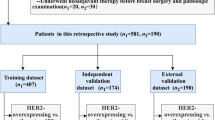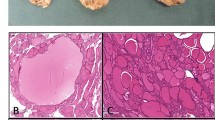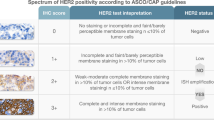Summary
We performed immunohistochemical analyses of 568 breast/cancer specimens using Ki-67, a monoclonal antibody specific for a nuclear antigen present in proliferating cells. The specimens were divided into three groups (I–III) according to the proportion of Ki-positive cells detected. These findings were compared with features of tumor extension as well as with certain prognostic variables.
There was no detectable correlation between Ki-67 reactivity and either tumor size or node involvement. In contrast, a statistically significant correlation was found between Ki-67 reactivity and tumor grading, in that G-I tumors had small growth fractions, while a high proportion of G-III tumors exhibited strong (group III) Ki-67 positivity. When growth fractions were compared with biochemical receptor status, a significant difference was detected between tumors with negative and positive findings for receptors. The same co-variation was observed with respect to the overexpression ofneu-protein P185, with mostneu-positive carcinomas being strongly positive for Ki-67 (group III).
In the relapse cases examined, there was a close correspondence between Ki-67 reactivity and the duration of the disease-free period. Long-term observation of patients with primary breast carcinoma revealed that, with regard to overall survival, the less reactive groups I and II differed significantly from group III. With respect to disease-free survival, no difference was detectable between Ki-groups II and III, but when these two groups together were compared with group I, a significant trend emerged. Similar results for both overall and disease-free survival were obtained for subgroups of pT2 and G-II carcinomas as well as for receptor expression. Node-negative tumors in the highly reactive group III exhibited a strong trend indicating unfavorable overall survival rates, whereas no such difference was demonstrable with respect to disease-free survival. Node-positive tumors could not be differentiated on the basis of overall survival, but the correlation with growth fraction was significant for disease-free survival.
In conclusion, Ki-67 offers a simple and effective method for defining the proliferating cell compartment of breast carcinoma, and may facilitate the assessment of individual tumors as well as efforts to predict the course of disease.
Similar content being viewed by others
References
Gerdes J, Schwab U, Lemke H, Stein H: Production of a mouse monoclonal antibody reactive with a human nuclear antigen associated with cell proliferation. Int J Cancer 31: 13–20, 1983
Lelle RJ, Heidenreich W, Stauch G, Gerdes J: The correlation of growth fractions with histologic grading and lymph node status in human mammary carcinoma. Cancer 59: 83–88, 1987
Verheijen R, Kuijpers HJH, Schlingemann RO, Boehmer ALM, Van Driel R, Brakenhoff GJ, Ramaekers FCS: Ki-67 detects a nuclear matrix-associated proliferation-related antigen. I. Species distribution and intracellular localization during interphase. J Cell Science 92: 123–130, 1989
van Dierendonck JH, Keijzer R, van der Velde CJH, Cornelisse CJ: Nuclear distribution of the Ki-67 antigen during the cell cycle: Comparison with growth fraction in human cancer cells. Cancer Res 49: 2999–3006, 1989
Collins V, Löffler RK, Tivey H: Observations on growth rates of human tumors. Am J Roentgenol 76: 988–1000, 1956
Kühn W, v Fournier D, Leppien G, Rummel HH, Müller A, Dick G: Korrelation morphologischer Kriterien mit der Wachstumsgeschwindigkeit beim Mammacarcinom. Geburtsh Frauenheilkd 43S: 24–29, 1983
Tubiana M, Pejovic MH, Chavaudra N, Contesso G, Malaise EP: The long term prognostic significance of the thymidine labeling index in breast cancer. Int J Cancer 33: 441–445, 1984
McGuire WL, Meyer JS, Barlogie B, Kute TE: Impact of flow cytometry on predicting recurrence and survival in breast cancer patients. Breast Cancer Res Treat 5: 117–128, 1985
Meyer JS: Growth and cell kinetic measurements in human tumors. Pathol Annu 16: 53–81, 1981
Tubiana M, Pejovic MH, Renaud A, Contesso G, Chavaudra N, Giovanni J, Malaise EP: Kinetic parameters and the course of disease in breast cancer. Cancer 47: 937–943, 1981
Meyer JS, Prey MU, Babcock DS, McDivit-tt RW: Breast carcinoma cell kinetics, morphology, stage, and host characteristics. Lab Invest 54: 41–51, 1986
Carter C: Relation of tumor size, lymph node status, and survival in 24740 breast cancer cases. Cancer 63: 181–187, 1989
Pickartz H, Kurtsiefer L, Fleige B, Schwarting R, Gerdes J, Stein H: Prognostische Bedeutung von Tumormarkern beim Mammacarcinom. Verh Dtsch Ges Path 70: 472, 1986
Hamper K, Caselitz J, Schreiber M, Rauchfuß A, Seifert G: Vergleichende Untersuchungen zum Proliferations- und Rezeptorverhalten von Speicheldrüsen- und Mammatumoren. Eine immunhistochemische Studie. Verh Dtsch Ges Path 70: 461, 1986
Gerdes J, Lelle RJ, Pickartz H, Heidenreich W, Schwarting R, Kurtsiefer L, Stauch G, Stein H: Growth fractions in breast cancers determinedin situ with monoclonal antibody Ki-67. J Clin Pathol 39: 977–80, 1986
Weikel W, Beck T, Rosenthal H, Herzog R: Die immunhistochemische Wachstumsfraktion (Ki-67) von Mammakarzinomen: Beziehungen zur Tumorausdehnung, Tumormorphologie und Rezeptortestung. Geburtsh Frauenheilkd 49: 277–282, 1989
Author information
Authors and Affiliations
Rights and permissions
About this article
Cite this article
Weikel, W., Beck, T., Mitze, M. et al. Immunohistochemical evaluation of growth fractions in human breast cancers using monoclonal antibody Ki-67. Breast Cancer Res Tr 18, 149–154 (1991). https://doi.org/10.1007/BF01990030
Issue Date:
DOI: https://doi.org/10.1007/BF01990030




